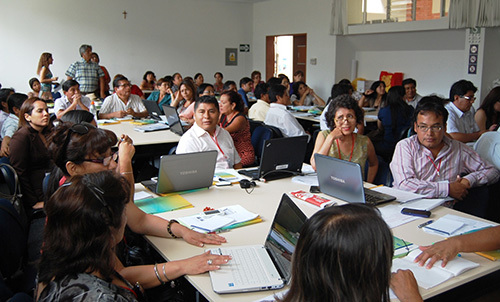
Jari Lavonen, Profesor de Educación Ciencia y jefe del departamento de la Universidad de Helsinki, Finlandia, will be speaking about teacher education in Finland with a particular focus on teacher effectiveness and professionalism at the Oppi Festival in Helsinki this week (Abril 11 y 12).
Finland has a reputation for excellence in education in terms of both high quality and equal opportunities for all. Por lo tanto, organizing a global learning festival in Helsinki designed for teachers and educators to celebrate best practices in education, and bringing together 90 of the world’s leading experts from 18 diferentes paises, makes a lot of sense, derecho?
That’s the hope of the organizers. The goal is that this festival will be the first in a series of international festivals in different countries for many years to come. The festival will offer workshops, presentations and discussions on the most recent themes in education, and feature top international thought leaders, including Sarah Brown, Sugata Mitra, De Tony Wagner, Pasi Sahlberg, Krista Kiuru and many other well-known voices from the world of education, which we are used to featuring in La Búsqueda Global para la Educación.
I recently caught up with Jari while he was leading a teaching training workshop in Lima, Perú.

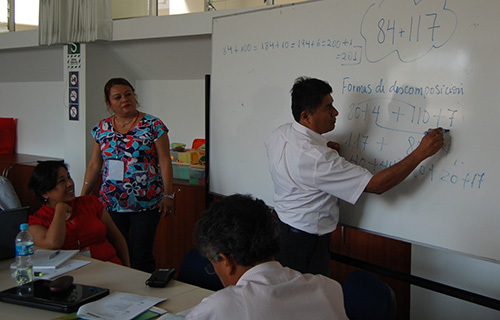
Tell me about your recent workshop in Lima. What are the goals?
The overall aim of the workshop has been to help Peruvian education experts plan a professional development program for mentors (accompañantes pedagógicos) in Peruvian school districts to support Peruvian teachers. Professors from the University of Helsinki and the Catholic University of Peru are working together on this. In our first meeting, we have given special attention to the issues related to the training process of mentors and the indirect influence on school teachers. A special emphasis of the development program is on teaching and learning mathematics and science, as well as on cultural diversity.
What are some of the key strategies you shared related to science teaching and learning?
I was focused on professional development and, moreover, observación, classification and inquiry as teaching and learning methods in primary science. These methods were discussed from a learning and motivation point of view. I gave talks about curriculum and assessment. I emphasized in my presentations that teachers in Finland are academic professionals who are able to plan broadly, including developing a local curriculum and assessing their own teaching and students’ aprendizaje. Countries around the world have undertaken reforms to prepare children for the demands of life and skills needed in the 21st century. There is no single strategy that can solve all the problems we face in education. Consecuentemente, a teacher should be able to make decisions on teaching strategies based on his/her group of students, research based knowledge on teaching, learning and motivation, and the local curriculum.

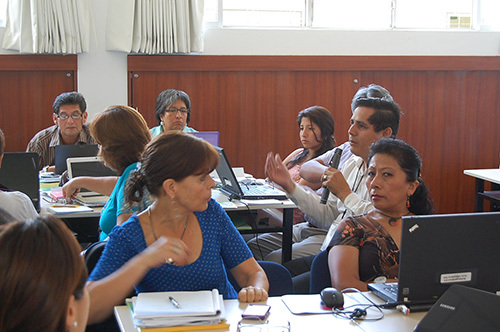
En términos generales, what do you believe are the key competencies teachers need to effectively teach those skills?
En mi opinión, this question should be approached from the school and teaching situation point of view. The school should support the learning of 21st century skills. En una escuela, principales, teachers and pupils need to be committed to work as developers, aiming to develop teaching, learning and collaboration at that school. Physical and technology environments as well as collaboration with families and society should be supportive for the development of those skills at school. El siglo 21 “movimiento” refers to the redefining of the goals of education and how learning is organized in order to meet the demands of the 21st century. 21st century individuals need both critical and creative thinking and should be able to: use a wide range of tools, like socio-cultural (idioma) and technological tools (education technology or ICT) for interacting effectively with the environment; engage and interact in a heterogeneous group; and take responsibility for managing their own lives and acting autonomously. Sin embargo, choosing the teaching/learning methods is not straightforward because students come from very diverse backgrounds. Por lo tanto, es importante utilizar una variedad de métodos de enseñanza que involucran a los estudiantes en la lucha contra el tema que hay que aprender de una manera tal que crean estructuras de conocimiento significativas y comprensibles que se basa en el aprendizaje. Este tipo de aprendizaje significativo se basa en la actividad y la intención, reflexión y autoevaluación, la colaboración y la interacción, construcción, contextualización, and cumulative learning.
How do you guide teachers’ y escuelas’ use of technology as an effective teaching tool?
The Finnish Ministry of Education has published national-level strategies for education and use of technology in education, and the National Board of Education has designed a national framework curriculum for the school level for supporting the planning of local curriculum and use of technology in education. Education units (por ejemplo. escuelas y universidades) crear sus propias estrategias y programas basados en la estrategia nacional. Este tipo de enfoque basado en la estrategia se ha aplicado en el trabajo curricular y en la implementación del uso de la tecnología en la educación escolar. Ha habido tres estrategias nacionales oficiales y varios proyectos de desarrollo nacional en el uso de la tecnología en la educación durante la última 25 años. Strategic planning and implementation in the Finnish context has been based on the idea of autonomous decision making at the school level. Universities and further education institutes have organized training focused on the use of technology in education. Sin embargo, muchos políticos y los investigadores no están satisfechos con la situación actual. It is still a challenge to encourage teachers to adopt the use of technology as part of their teaching and for them to appreciate the usefulness of technology in the science classroom. There is currently a lot of discussion in Finland on the use of technology in the education and preparation of teachers.

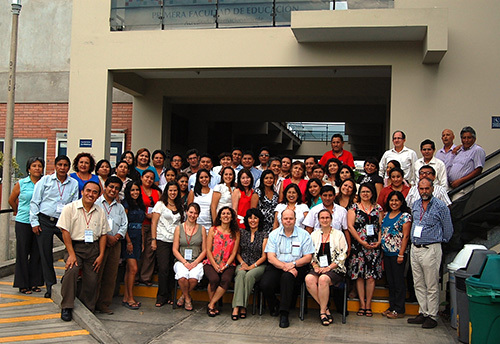
Do you see the role of the Finnish teachers changing as online learning evolves?
In many schools, there are good facilities and teachers are competent using technology, flexible learning approaches or distance learning. There is a lot of research in this area. Sin embargo, there is also variation in competencies of teachers and facilities. Por lo tanto, an integrated approach to develop technology use in education is needed, meaning not only investment in technology infrastructure, like mobile devices, platforms, social media and cloud-services, but also short and long-term in-service-training for teachers, supporting the pedagogical use of technology infrastructure in the classroom. The politicians are perhaps too optimistic about the use of technology. En mi opinión, it is more important to internalize the ideas of meaningful learning and motivational aspects of learning. Meaningful learning is grounded on activity and intention, reflexión y autoevaluación, la colaboración y la interacción, construcción, contextualización, and cumulative learning. Central to motivation are basic psychological needs: the need for autonomy, the need for competencies, and the need for relatedness (need to belong to a group). In addition to learning and motivation, several other pedagogical views are important, like integration and inclusion of personalized learning. Y por supuesto, the versatile use of technology could support student learning and motivation. Finnish schools are good at networking with families and other parties in society. We have had research projects where we have recognized that different kinds of networking foster the integration of technology into education, such as co-operation among schools; among teachers, developers and researchers; and among schools and their environment or working life. Networking is needed at all levels: inside school, between schools, and moreover, at national and international levels.
Para más información sobre el Festival Oppi: http://oppifestival.com/

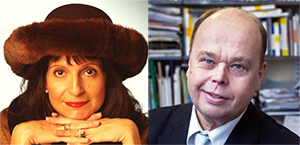
All photos are courtesy of Jari Lavonen.
En La Búsqueda Global para la Educación, unirse a mí y reconocidos a nivel mundial los líderes de opinión, incluyendo a Sir Michael Barber (Reino Unido), DR. Michael Bloquear (EE.UU.), DR. Leon Botstein (EE.UU.), Profesor Clay Christensen (EE.UU.), DR. Linda Darling-Hammond (EE.UU.), DR. Madhav Chavan (India), El profesor Michael Fullan (Canada), El profesor Howard Gardner (EE.UU.), El profesor Andy Hargreaves (EE.UU.), Profesor Yvonne Hellman (Países Bajos), Profesor Kristin Helstad (Noruega), Jean Hendrickson (EE.UU.), Profesor Rose Hipkins (Nueva Zelanda), Profesor Cornelia Hoogland (Canada), Honorable Jeff Johnson (Canada), Señora. Chantal Kaufmann (Bélgica), DR. Eija Kauppinen (Finlandia), Secretario de Estado Tapio Kosunen (Finlandia), Profesor Dominique Lafontaine (Bélgica), El profesor Hugh Lauder (Reino Unido), Profesor Ben Levin (Canada), Señor Ken Macdonald (Reino Unido), Profesor Barry McGaw (Australia), Shiv Nadar (India), Profesor R. Natarajan (India), DR. PAK NG (Singapur), DR. Denise Papa (Estados Unidos), Sridhar Rajagopalan (India), DR. Diane Ravitch (EE.UU.), Richard Wilson Riley (EE.UU.), Sir Ken Robinson (Reino Unido), Profesor Pasi Sahlberg (Finlandia), El profesor Manabu Sato (Japón), Andreas Schleicher (PISA, OCDE), DR. Anthony Seldon (Reino Unido), DR. David Shaffer (EE.UU.), DR. Kirsten Immersive Are (Noruega), Canciller Stephen Spahn (EE.UU.), Yves Theze (Lycee Francais EE.UU.), Profesor Charles Ungerleider (Canada), Profesor Tony Wagner (EE.UU.), Sir David Watson (Reino Unido), Profesor Dylan Wiliam (Reino Unido), DR. Marcos Wormald (Reino Unido), Profesor Theo Wubbels (Países Bajos), El profesor Michael Young (Reino Unido), y el profesor Zhang Minxuan (De China) a medida que exploran las cuestiones de educación cuadro grande que todas las naciones se enfrentan hoy. La Búsqueda Global para la Educación Comunitaria Página
C. M. Rubin es el autor de dos ampliamente leído serie en línea por la que recibió un 2011 Premio Upton Sinclair, “La Búsqueda Global para la Educación” y “¿Cómo vamos a Leer?” Ella es también el autor de tres libros más vendidos, Incluido The Real Alice in Wonderland, y es el editor de CMRubinWorld.
Siga C. M. Rubin en Twitter: www.twitter.com/@cmrubinworld


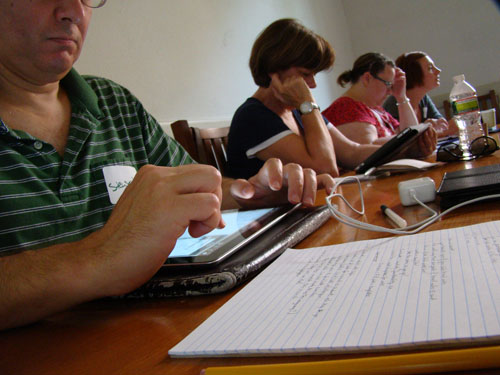
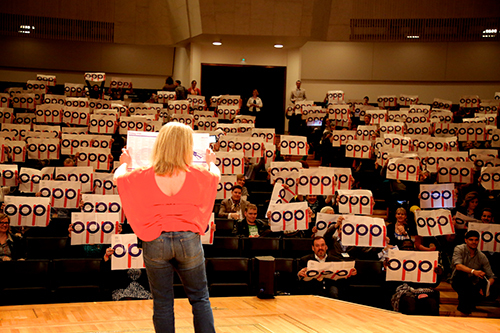
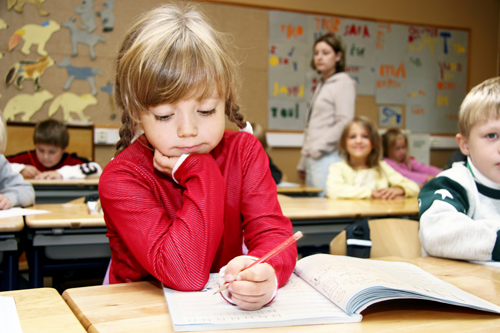
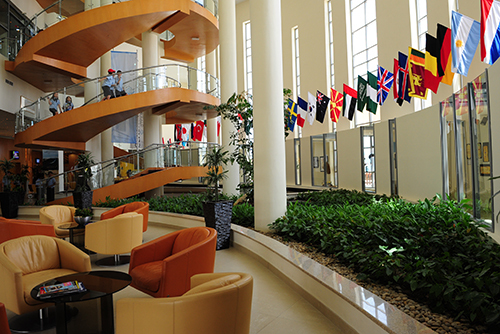
Comentarios recientes